John Kerry: ‘Respect Democracy – By Going Out And Voting’
Air Date: Week of October 12, 2018
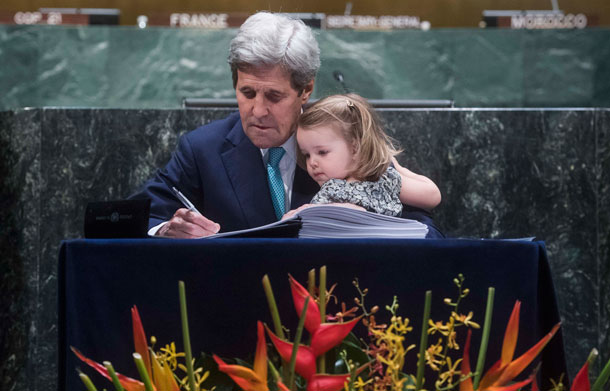
On Earth Day, April 22, 2016, then US Secretary of State John Kerry signed the Paris Agreement as his granddaughter Isabelle looked on. (Photo: UN Photo/Amanda Voisard, Flickr CC BY-NC-ND 2.0)
As Secretary of State under President Obama, John Kerry made climate change one of his top priorities and played a key role in the success of the Paris Agreement. Now, as the Trump Administration walks back climate policies and the world grapples with dire warnings from scientists, Kerry says human society and life itself are imperiled. But he’s not without hope and urges American citizens to bring about change through the power of voting. In this second half of our featured conversation, Kerry and Host Steve Curwood discuss the climate challenge, Kerry’s memoir, Every Day Is Extra, and why the 74-year-old is far from ready to retire from public life.
Transcript
CURWOOD: We continue our conversation this week with John Kerry, whose memoir is called, Every Day Is Extra. In it the former Secretary of State and Democratic Presidential Nominee writes about his formative childhood years, and his legislative and diplomatic work on climate change, acid rain, and much, much more. And if you missed the first part of our conversation, you can hear it at our website, loe.org. I began the second part of our talk by asking Secretary Kerry to consider the issue of stranded assets as it applies to climate change.
CURWOOD: Let me ask you just to think, reflect on this for a moment. Looking at American history, in 1860, in the south there was more monetary value in slaves than there was in the land. By 1865, that was a classic stranded asset, all that value disappeared. To what extent today do you think we're being held hostage by folks who think that all that fossil fuel in the ground which is on balance sheets at billions and billions and billions of dollars – and it can't all be burned if we understand the science correctly – to what extent are we headed down a path? I mean, to solve the problem that we had with slavery, I mean, is the moral question there? Just like we have today with climate as well as the economic question. To solve that problem we wound up in a pretty, in a very bloody war.
KERRY: Yeah, I mean I don't think that's the choice for America now. I think that I think most of the executives that I know at the higher level of the oil industry are all diversifying. Shell, BP, they're all investing in new energy. They're ready to move where the market would go, and I mean we're not going to be able to transition fast enough that you'd suddenly dry up and not have oil or gas involved. There's going to be oil and gas for a while. It's just the nature of the beast. We've got to try to guarantee it's not for too long. Why? I'm simply listening to the scientists. I mean, I'm listening to and understanding the science. If we don't move off fossil fuels fast enough, we could reach what's called a tipping point where things begin to cascade downwards in a spiral of destruction and dying, of dying seas, dying trees, dying species of various kinds, because it's not sustainable. And if you get into that kind of a spiral nobody knows, nobody can tell you how you break out of it. I'm just applying a precautionary principle to the idea of governing. I mean we buy insurance to make sure if our home burned down we're going to be able to rebuild it. We buy car insurance to fix the wreck and you know life insurance in the event somebody lost a life, the family is OK. Why aren't we buying insurance against the death and destruction that will come with increased storms and increase climate change? It's beyond my understanding why we could have a president who is a denier of this science. Ninety-eight percent of all the scientists in the world who ever watched this and looked at it with peer reviewed studies all say this is happening now, and it's caused by not exclusively but largely by human beings, and if we don't respond to this, whoa whoa to us. We're entering into a sort of suicide pact.
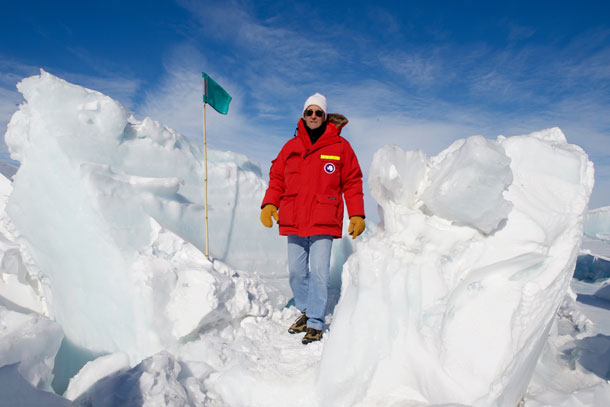
In November of 2016, Secretary Kerry became the highest-ranking United States government official ever to visit Antarctica where he met with scientists from all over the world to learn more about climate change. Secretary Kerry writes, “The scientific evidence presented was compelling and dramatically increased my sense of urgency about the problem.” (Photo: Glen Johnson / United States Department of State)
CURWOOD: It could be worse than the United States Civil War.
KERRY: Well, right now we are heading...the goal in Paris was to keep the rise of the Earth's temperature to two degrees Centigrade, and we were going to try to excite enough nations to become involved that we could meet that standard. We now know at the current rate we're not meeting that standard. We're heading now towards four degrees Centigrade rise in the temperature of the average temperature of the planet. That's catastrophic. You'll have water battles, you'll have refugees moving, you think we have tough migration challenges today. Wait until people can't produce food in various parts of the world. Wait until their water dries up and they're not able to live. What happens when the oceans change and you have a migration away from certain stocks that people have relied on for food and so forth. There are just so many unknowns here. I'm not willing to just throw up my hands and say, oh, someone's going to take care of this because that's just not responsible given the input.
CURWOOD: Back in the day as lieutenant governor of Massachusetts, which is not exactly ordinarily a very exciting position, you made your mark jumping on the acid rain problem. Tell me, what did that teach you about the politics of environmental protection.
KERRY: That reasonable people with a reasonable purpose in public life are able to work together, Republican and Democrat, in order to do things that are good for American citizens. I was a lieutenant governor, but Michael Dukakis allowed me to be the chair of the governor's task force for him. I worked with Governor John Sununu of New Hampshire, I worked with Governor Dick Celeste of Ohio, and we put together, the three of us, an approach drawn up by the way by the American Enterprise Institute, a conservative approach to how you use the market to be able to accomplish something you want to accomplish. And there was a market incentive for people to actually buy and trade sulfur which reduced the amount of sulfur. We got acid rain under control through the system, and then when I was in the Senate, I was able to use that and put it into the Clean Air Act. And so it became part of the national program, so you don't hear about acid rain now. We could do the same thing with climate change if we had the leadership that was willing to recognize the greatest market, the biggest market on this planet is the energy market. It is today. There are four to five billion users. They're going to be about nine billion users in the next 30 years because that's going to be the population of the world and we have the ability through the deployment of sustainable renewable alternative energy to be able to limit our emissions and control climate.
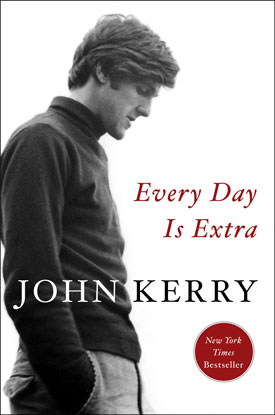
Every Day Is Extra caught public attention on the New York Times Best Seller List. (Photo: Courtesy of Simon & Schuster)
CURWOOD: You write in your book that despite President Trump's rollbacks and attempts to roll back President Obama's signature climate environmental policies, which you helped to create, you remain optimistic. Why?
KERRY: Well, I am optimistic. I'll tell you why. First of all, because living without optimism would be miserable. I don't want to be miserable. But more importantly because I see what's happened in my lifetime, which is what I write about in the book, "Every Day is Extra". I mean, every day is actually a way to have respect for life itself, and for our choices about what we do with each day. And because I was lucky enough with a bunch of friends to come back from a war alive and whole, I felt I had an obligation to use every day to its maximum. It was a gift. Other guys didn't get that gift, and I thought we owed it to them and their legacy as well as to ourselves and our own value system to live a life of purpose, to do something. So, that's what I set out to do and in fact the my book, which is very personal - it's not a secretary of state policy book – it's a journey, it's the description of a personal journey and what I learned from that and what I learned from it is we have every reason to be optimistic. Why? Because we're doing amazing things on this planet. We're breaking new barriers every day in terms of science, in terms of our understanding of things. We are living better. We have a higher standard of living, not withstanding poor people and homeless. We do have a higher standard of living. The severe poverty rate when I was in college was 50 percent of this world. Today it's less than 10 percent for the first time in history. We brought 450 million people out of poverty in China, 400 million in India. Fifteen years ago South Korea was an aid recipient country. Today, it's a donor country. So, I see this transformation taking place. We're curing diseases we never thought we would never cure - smallpox, tuberculosis, polio. I mean, we're doing an amazing job with cancer now with the genome. We have an ability to give specialized cancer treatment. People are living longer, living better and that.
So, the challenge remains, but the ability to meet the challenge is absolutely clear to all of us. So, that's what leaps out at me is that technology will continue to improve life. People can live longer, I hope better, but we're we got to organize ourselves better. We're not making our democracy and our governance choice work effectively, and we've learned through history that the alternatives aren't pretty. We don't want to have a monarchy, we don't want to have a dictatorship, we don't want socialism or communism or whatever I don't believe. I think democracy, our democracy, has unleashed the greatest creativity, the greatest freedom, but people have to respect it by going out and voting. 54.2 percent is not acceptable, and I've been in parts of the world as an election observer in Sudan and the West Bank and Kenya and the Philippines where I've seen people come out and wait 15 hours one day in the hot sun with tanks in some places and guns in the hands of people to vote. And I remember going up to a fellow in Sudan waiting in the heat and long line and I said "Look, I'm really sorry," because I was an observer and I said, "I'm so sorry the lines are long and you have to wait so long to vote." He said, "I waited 50 years to vote." I'll wait whatever it is now that I'm in this line to vote. They will do that. Why don't we?
CURWOOD: So, what's your proudest accomplishment in terms of climate or the environment?
KERRY: You know I been asked that. I have never reduced my public career to one accomplishment. I just don't do that; I can't do that. I'm proud of what I did on climate change, but I'm proud of the Iran nuclear deal that got rid of a nuclear weapon and the capacity to build one, I'm proud of getting chemical weapons out of Syria, and proud of what we did with AIDS in Africa. A program that Bill Frist and I actually started in the United States Senate. I'm proud of getting children's health care into the Senate health care bill.
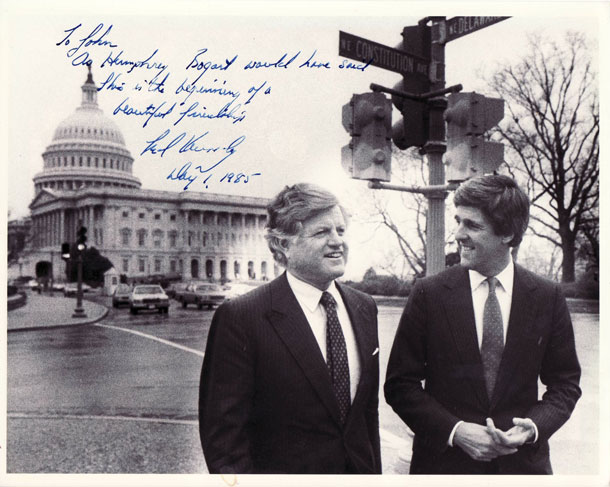
John Kerry with Senator Ted Kennedy, prior to being sworn into the Senate for the first time on January 2, 1985. John Kerry’s friend and senior colleague inscribed the photograph: “To John – as Humphrey Bogart would have said ‘this is the beginning of a beautiful friendship’ Day 1, 1985.” (Photo: John Kerry for Senate)
I'm proud of holding Washington accountable with some of the things I write about in the book, with the exposure of the contra the Iran Contra and the lies that were taking place and Noriega whose money was coming from drugs, coming into the veins of our children in various cities here, proud of what I did the Middlesex DA's office, proud of opposing the war. So, I can't pick one of those things. It's been a continuum. It's been a life's journey, and there's more to come in the sense that I'm not going to stop being a citizen. I'm going to continue to fight for the things that make a difference.
CURWOOD: So, what's next for you?
KERRY: Next I'm going to stay involved. I can't tell you how or what I'll be doing. I'm working with the Carnegie Endowment for Peace International Peace in Washington. Very pleased to be there to be helpful in some international conflict issues. I am teaching course as a fellow on Global Affairs at Yale University and I'm teaching course on American power in the 21 century and the tools of diplomacy and I was writing the book which is pretty time consuming. I'm doing a little bit of private sector business to pay the bills and do things. So, I've got a pretty broad bandwidth right now that's getting filled up fast.
CURWOOD: If people pick up your book they'll be surprised to see how talented you are as a writer. What a nice narrative arc together for this.
KERRY: Well, thank you. So, I think it turned out OK. I think it turned out OK.
CURWOOD: So, what's your secret?
KERRY: Secret to what?
CURWOOD: To writing something like this. It's so readable.
KERRY: I think over the years I've been learning. I'm still learning, but I've been learning how to communicate, how to paint a picture. And I've always done that actually since when I went to Vietnam, I wrote a lot about what I was seeing and observing. I've always enjoyed writing but I've never written that much in a personal way this way. I've written several other books, but they were policy books and it's a very different kind of book. This book is personal. This talks about my faith, talks about my family, talks about my divorce, talks about growing up in a war and opposing the war and tough things, talks about losing the presidency of the United States by one state, and how you turn around and come back from that. I got a really nice note from a guy that had been running for office and he lost, and he wrote me about how he had been reading my book, about how I processed that loss in what I decided to do, and he's found it really helpful. That I love. I mean, that really means something to me.
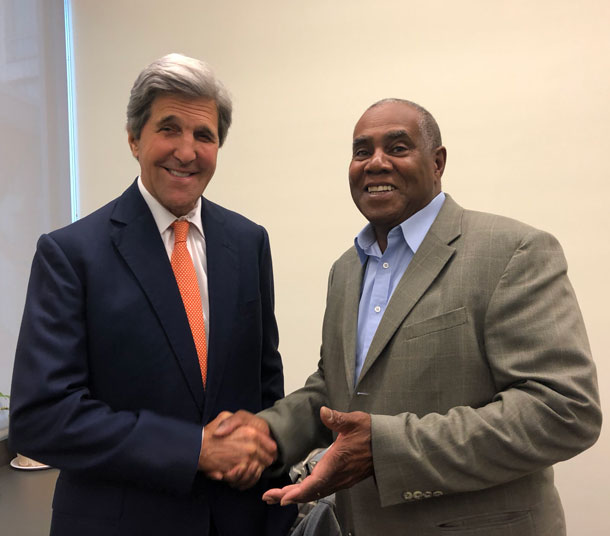
Former Secretary of State John Kerry and Host Steve Curwood. (Photo: Jenni Doering)
CURWOOD: John Kerry's a former Secretary of State, Democratic candidate for President of the United States, a five-term United States Senator from Massachusetts, and his new book is called, "Every day is extra." Secretary Kerry, thanks so much for taking the time with me today.
KERRY: Thank you for a great questions and a really nice conversation. Appreciate it.
Links
Part One of the Conversation: “John Kerry Looks Back – And Ahead”
Living on Earth wants to hear from you!
Living on Earth
62 Calef Highway, Suite 212
Lee, NH 03861
Telephone: 617-287-4121
E-mail: comments@loe.org
Newsletter [Click here]
Donate to Living on Earth!
Living on Earth is an independent media program and relies entirely on contributions from listeners and institutions supporting public service. Please donate now to preserve an independent environmental voice.
NewsletterLiving on Earth offers a weekly delivery of the show's rundown to your mailbox. Sign up for our newsletter today!
 Sailors For The Sea: Be the change you want to sea.
Sailors For The Sea: Be the change you want to sea.
 The Grantham Foundation for the Protection of the Environment: Committed to protecting and improving the health of the global environment.
The Grantham Foundation for the Protection of the Environment: Committed to protecting and improving the health of the global environment.
 Contribute to Living on Earth and receive, as our gift to you, an archival print of one of Mark Seth Lender's extraordinary wildlife photographs. Follow the link to see Mark's current collection of photographs.
Contribute to Living on Earth and receive, as our gift to you, an archival print of one of Mark Seth Lender's extraordinary wildlife photographs. Follow the link to see Mark's current collection of photographs.
 Buy a signed copy of Mark Seth Lender's book Smeagull the Seagull & support Living on Earth
Buy a signed copy of Mark Seth Lender's book Smeagull the Seagull & support Living on Earth

